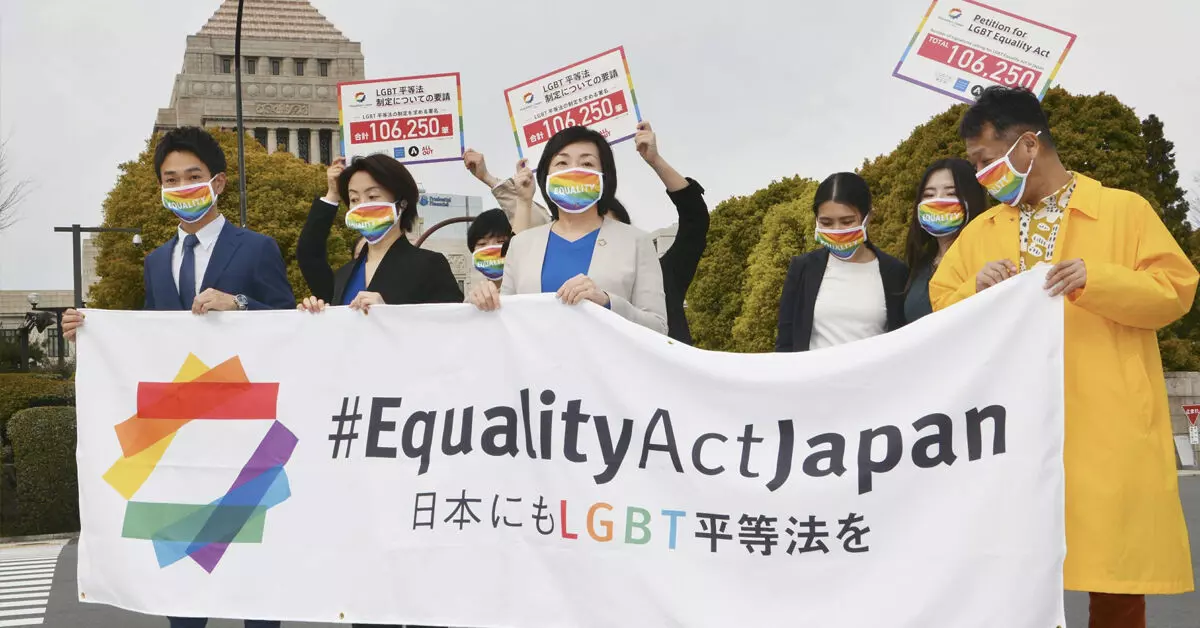Featured
Japanese citizens demand equal rights for LGBT+ community ahead of Tokyo Olympics — Know Why?
The eyes of LGBT+ activists remain on Japan's parliament, as they aim to use the Tokyo Olympics as a global spotlight to end discrimination against gay, bisexual and transgender people in the country.

Equality Act Japan campaign (Source: AP News)
With Japan witnessing Covid-19 cases at a rate that it has never before, Prime Minister Yoshihide Suga has announced an emergency in Tokyo — the venue for the Olympic Games which will unfold between July 23 and August 8, 2021. In a survey released this week in Japan, 83 percent of those polled said they did not want Tokyo to hold the Olympics and the Paralympics. That total was up 14 percentage points from a survey in April.
As the roadmap for Tokyo Olympics partially remains in doubt, the eyes of LGBT+ activists remain on Japan's parliament, as they aim to use the global spotlight to end discrimination against gay, bisexual and transgender people in the country. #EqualityActJapan campaign has gathered 106,250 signatures (including 41,333 from Japan) during an online petition drive from October 15, 2020 to February 21, 2021. Many athletes and others affected by the lack of protection in Japan have added their names and support to the campaign for an Equality Law in Japan. They have signed a petition calling on the government to pass an LGBT+ equality law before the Tokyo Games open on July 23 to honour its key themes of celebrating 'unity in diversity' and 'passing on legacy for the future'.
A look at LGBTQ rights in Japan
Apart from a time in the 1870s, gay sex was never illegal in Japan. However, in the last century, LGBT+ rights were supressed in an attempt to foster a strong family-centric culture. Being openly gay remains largely taboo although acceptance of homosexuality in Japan rose to 68% in 2019 from 54% in 2002, a poll by the U.S.-based Pew Research Center found.
Japan is the only G7 nation not to fully recognise same-sex partnerships, but a recent court ruling raised hopes for a change in the law after it stated that not allowing gay couples to marry was unconstitutional. Japan has slowly shown increased support and awareness of sexual diversity but lacks legal protections, while dozens of other countries have allowed same-sex marriages and enacted other laws protecting the rights of sexual minorities.
Japanese LGBT groups have pressed for six years to pass legislation to protect their rights, and their progress is seen in sharply changing attitudes in Japanese society, with public support for LGBT equality surging in recent years. In November 2020, a nationwide public opinion survey found that 88 percent of those polled "agree or somewhat agree" with the "introduction of laws or ordinances that ban bullying and discrimination (in relation to sexual minorities)." Athletes and activists have spoken out in support of an equality law ahead of the Games, highlighting that the governing Olympic Charter bans "discrimination of any kind", including on the grounds of sexual orientation.
All of Japan's political parties were considering the enactment of the country's first LGBT legislation. The signatures in support of the legislation were submitted to the Japan Innovation Party, the Constitutional Democratic Party of Japan, the Social Democratic Party, and the KOMEITO.
Latest update
Allegations have come up against Japan's ruling party for violating the Olympic charter after it failed to approve a bill to protect the rights of the LGBT community, during discussions marred by homophobic outbursts from conservative MPs. Closed meetings held this month to discuss the anti-discriminatory bill, ended without agreement after some Liberal Democratic party (LDP) MPs said the rights of sexual minorities had "gone too far".
The failure to back a proposed law was condemned by human rights groups, which said the party deserved a "gold medal for homophobia", two months before Tokyo is due to host the delayed 2020 Olympics.
According to The Guardian, An unnamed lawmaker described LGBT people as "morally unacceptable", while another MP, Kazuo Yana, said sexual minorities were "resisting the preservation of the species that occurs naturally in biological terms", media reports said.
However, the committee that is organizing the Olympics in Tokyo has declined to say whether Japanese lawmakers' anti-LGBTQ comments violated the Olympic Charter's nondiscrimination clause. Despite the opportunity brought by the Olympics, analysts believe Prime Minister Yoshihide Suga is unlikely to push for reform before parliament closes in June.
Japan has taken a leadership role at the United Nations by voting for both the 2011 and 2014 Human Rights Council resolutions calling for an end to violence and discrimination based on sexual orientation and gender identity. But LGBT people in Japan continue to face intense social pressure and fewer legal protections than other Japanese. By passing landmark legislation to protect LGBT people including athletes, Japan could be a global LGBT rights leader, and become part of Japan's permanent Olympic legacy.
